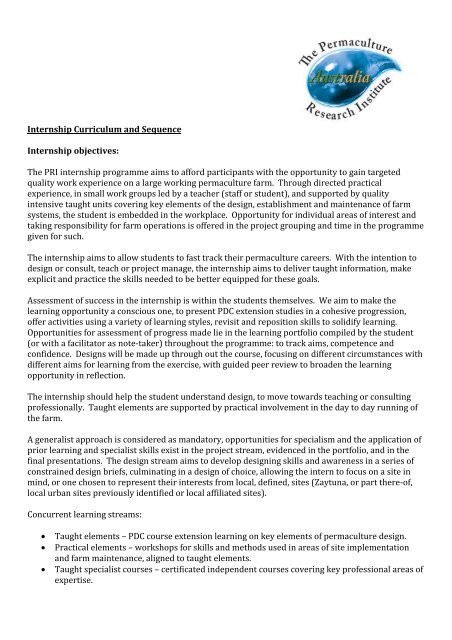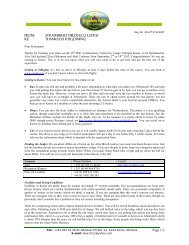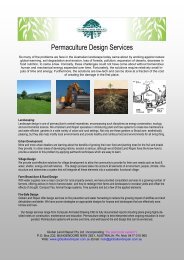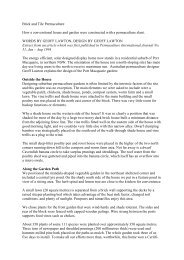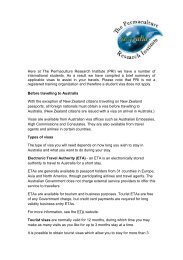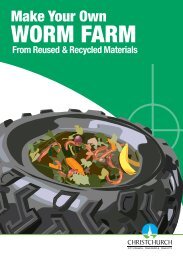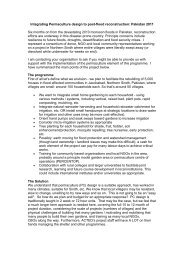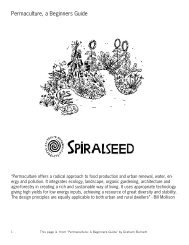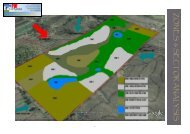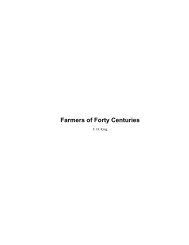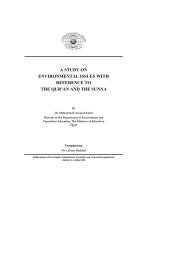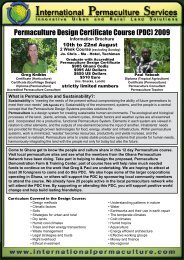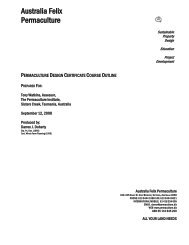Internship Scope and Sequence PDF here
Internship Scope and Sequence PDF here
Internship Scope and Sequence PDF here
Create successful ePaper yourself
Turn your PDF publications into a flip-book with our unique Google optimized e-Paper software.
<strong>Internship</strong> Curriculum <strong>and</strong> <strong>Sequence</strong><br />
<strong>Internship</strong> objectives:<br />
The PRI internship programme aims to afford participants with the opportunity to gain targeted<br />
quality work experience on a large working permaculture farm. Through directed practical<br />
experience, in small work groups led by a teacher (staff or student), <strong>and</strong> supported by quality<br />
intensive taught units covering key elements of the design, establishment <strong>and</strong> maintenance of farm<br />
systems, the student is embedded in the workplace. Opportunity for individual areas of interest <strong>and</strong><br />
taking responsibility for farm operations is offered in the project grouping <strong>and</strong> time in the programme<br />
given for such.<br />
The internship aims to allow students to fast track their permaculture careers. With the intention to<br />
design or consult, teach or project manage, the internship aims to deliver taught information, make<br />
explicit <strong>and</strong> practice the skills needed to be better equipped for these goals.<br />
Assessment of success in the internship is within the students themselves. We aim to make the<br />
learning opportunity a conscious one, to present PDC extension studies in a cohesive progression,<br />
offer activities using a variety of learning styles, revisit <strong>and</strong> reposition skills to solidify learning.<br />
Opportunities for assessment of progress made lie in the learning portfolio compiled by the student<br />
(or with a facilitator as note-taker) throughout the programme: to track aims, competence <strong>and</strong><br />
confidence. Designs will be made up through out the course, focusing on different circumstances with<br />
different aims for learning from the exercise, with guided peer review to broaden the learning<br />
opportunity in reflection.<br />
The internship should help the student underst<strong>and</strong> design, to move towards teaching or consulting<br />
professionally. Taught elements are supported by practical involvement in the day to day running of<br />
the farm.<br />
A generalist approach is considered as m<strong>and</strong>atory, opportunities for specialism <strong>and</strong> the application of<br />
prior learning <strong>and</strong> specialist skills exist in the project stream, evidenced in the portfolio, <strong>and</strong> in the<br />
final presentations. The design stream aims to develop designing skills <strong>and</strong> awareness in a series of<br />
constrained design briefs, culminating in a design of choice, allowing the intern to focus on a site in<br />
mind, or one chosen to represent their interests from local, defined, sites (Zaytuna, or part t<strong>here</strong>-of,<br />
local urban sites previously identified or local affiliated sites).<br />
Concurrent learning streams:<br />
• Taught elements – PDC course extension learning on key elements of permaculture design.<br />
• Practical elements – workshops for skills <strong>and</strong> methods used in areas of site implementation<br />
<strong>and</strong> farm maintenance, aligned to taught elements.<br />
• Taught specialist courses – certificated independent courses covering key professional areas of<br />
expertise.
• Interest elements – project work drawing on workshop skills, applied to areas of need or<br />
development on the farm.<br />
• Reflective learning – self guided, with assistance of facilitators, to track <strong>and</strong> exhibit progress<br />
through the portfolio.<br />
Week by week:<br />
Week Focus Staffing<br />
1 Orientation <strong>and</strong> introduction to course <strong>and</strong> farm.<br />
GL, TB, NL<br />
Design – Zaytuna Farm.<br />
2 Earthworks course<br />
GL, TB, NL<br />
Design – reinvent a l<strong>and</strong>scape to fit set elements.<br />
3 Productive systems on the farm.<br />
GL, TB, NL<br />
Design – integration of diverse productive elements to a l<strong>and</strong>scape<br />
profile.<br />
4 Urban l<strong>and</strong>scape design course<br />
NH, GL, NL<br />
Design – small scale / urban sites<br />
5 Project management / Aid workers course<br />
GL, NL<br />
Design – aid scenarios design choice:<br />
• Development aid<br />
• Extension aid<br />
• Humanitarian aid<br />
6 PDC Teacher Training course<br />
GL, NL<br />
Design – PDC curriculum.<br />
7 Interactivity of elements <strong>and</strong> intensive systems.<br />
G,L TB, NL<br />
Design – detailed focus on element specifics.<br />
8 Soil Biology course<br />
PT, GL<br />
Design – home grown active soils maintenance.<br />
9 Cyclic systems <strong>and</strong> system evolution <strong>and</strong> refinement.<br />
GL, TB, NL<br />
Design – pet projects.<br />
10 Closure <strong>and</strong> celebration of progress. GL, NL<br />
NOTE: Week layout can change slightly per internship, adaptable for teachers <strong>and</strong> facilitators.<br />
Certificate courses highlighted.<br />
Staffing abbreviations:<br />
GL – Geoff Lawton<br />
NL – Nadia Lawton<br />
PT – Paul Taylor<br />
NH – Nick Huggins<br />
TB – Tim Barker<br />
LB – Lesley Byrne.<br />
CD – Chris Darker<br />
Fs – Facilitator team (teaching assistants: to include Lesley <strong>and</strong> Nadia as needed).<br />
W/S Ts – Workshop teachers: to include all staff as appropriate.
Assessment:<br />
The assessment of progress in the internship is fundamentally student centred: particular to<br />
individual start points, guided by individual interests <strong>and</strong> goals.<br />
The internship does not aim to provide a summative assessment – no pass or fail at the end. Rather,<br />
formative assessment is maintained throughout the 10 week course, with significant feedback offered<br />
to the individual student.<br />
In the introductory week, interns will complete an opening needs-analysis questionnaire so that a<br />
start point for each can be established <strong>and</strong> progress made through the course can be tracked. The<br />
intern will undertake four targeted design tasks, maintain a learning diary throughout the course,<br />
undertake, <strong>and</strong> present on, a project in an area of particular personal interest <strong>and</strong> together with the<br />
opening statement of prior knowledge <strong>and</strong> experience compile the whole into a portfolio.<br />
Individual elements of assessment:<br />
The opening questionnaire:<br />
To establish a start point for each individual intern, to both course organisers <strong>and</strong> the student<br />
themselves, so that progress can be tracked through the course.<br />
The learning diary:<br />
A record of their learning, note form – not a polished document, to include reflection on the taught<br />
topics, courses <strong>and</strong> work shops. To also include evidence of the application of taught elements in<br />
other circumstances or on different examples through the project groups system.<br />
Feed back regularly throughout the course, checked on by the facilitators during the 10 weeks to keep<br />
them on track <strong>and</strong> make sure that it is actually happening, <strong>and</strong> that they are actually doing what they<br />
say they are!<br />
The design work:<br />
A series of design challenges will be set through the programme: one in each week, focusing on the<br />
taught content for the week.<br />
Work on each design challenge will be guided by peer group work, facilitator input <strong>and</strong> expert<br />
feedback from Geoff <strong>and</strong> will be reviewed by presentation to peers in small groups or to the whole<br />
class as appropriate. Active reflection on the design process <strong>and</strong> choices made in design will be<br />
encouraged in review sessions to broaden the learning experience for all.<br />
The portfolio:<br />
The opening questionnaires, learning diary <strong>and</strong> designs are compiled into a portfolio to be submitted<br />
to Geoff at the end of week 9, checked over, copied <strong>and</strong> returned to the interns – unmarked - to be<br />
then used to inform a reference if <strong>and</strong> when requested.<br />
The project presentation:<br />
A st<strong>and</strong> up talk (with or without multi-media presentation technology) to their peers, judged by their<br />
peers on some element of the farm, course or application of PC ideas or ethics. Very open, to<br />
encourage the free pursuit of interests; peer reviewed to give closure <strong>and</strong> the chance for them to<br />
appreciate one another’s work <strong>here</strong> or indeed aspirations for work to come. To be drawn from<br />
practical work, admin, teaching styles, ethics, outreach, anything….<br />
The presentations can be delivered in class or in the field, w<strong>here</strong>ver the individual intern is more<br />
comfortable.


